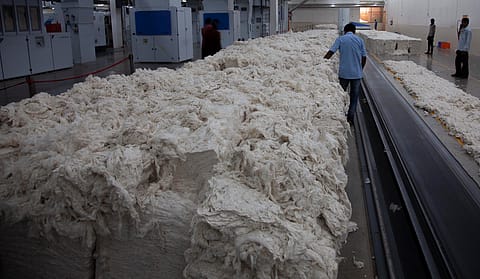Government extends exemption of cotton import duty to Dec 31 amid U.S. tariff woes
To facilitate the availability of cotton for the Indian textile sector, the government had earlier exempted the 11% import duty on cotton from August 19th to September 30th.

The Central Government has extended the exemption of cotton import duties until 31st December, according to a press release issued by the Ministry of Finance on Thursday, in a bid to support the local textile industry, which is among the worst hit industries after the Trump administration imposed 50% punitive tariffs on all Indian exports to the U.S.
To augment the availability of cotton for the Indian textile sector, the Central Government had exempted the 11% import duty on cotton from August 19th to September 30th. However, the government has now extended this provision until the end of December to support exports further.
President Trump’s doubling of reciprocal tariffs to 50% came into effect on Wednesday, and Indian exporters are bracing for tougher times. S. C. Ralhan, President, Federation of Indian Export Organisations (FIEO), told Fortune India earlier that textiles and apparel manufacturers in Tirupur, Noida, and Surat have halted production amid worsening cost competitiveness, and the sector is losing ground to lower-cost rivals from Vietnam and Bangladesh.
Ratings agency Crisil also said that the readymade garment makers in Tirupur are set to bear the biggest brunt once the tariffs are implemented. “The Tirupur cluster, which accounts for over 30% of India’s readymade garments exports, will be severely impacted as 30% of its exports are to the U.S.,” the rating agency said.
The government’s relief over import duties also comes at a time when various organisations have been calling for sector-specific reprieves to mitigate the impact of tariffs. The Delhi-based think tank Global Trade Research Initiative (GTRI) has suggested introducing targeted credit lines for highly impacted industries, such as the apparel sector, to prevent retrenchments, including mass layoffs and avert the closure of companies in the industry.
GTRI also called for temporary enhancement of export incentive schemes to support liquidity, while introducing wage-support programmes for workers in key hubs like Tirupur. GTRI also advocates for market diversification and urges the government to lead sector-specific trade missions for highly exposed industries, such as the apparel sector, to alternative markets.
FIEO, on the other hand, has sought a moratorium on the payment of principal and interest for loans for a period of up to a year for exporters. Additionally, automatic enhancement of the existing limit by 30% along with collateral-free lending on ECLGS lines may also be considered, as this will help alleviate the stress on these companies without placing a significant burden on the exchequer, the organisation said.